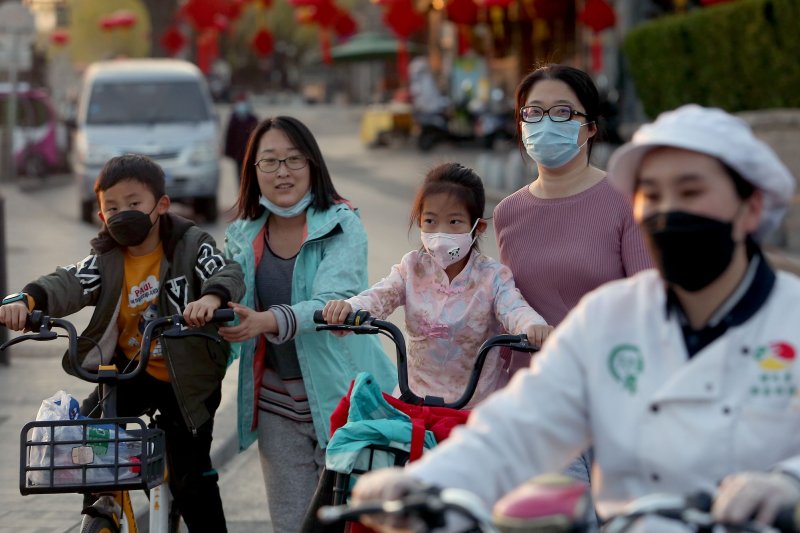
Residents in Beijing, China, wear protective face masks to guard against the coronavirus disease. No new local cases were reported in China on Thursday. Photo by Stephen Shaver/UPI | License Photo
March 26 (UPI) -- Leaders of the G20 nations on Thursday pledged to inject more than $5 trillion into the global economy to minimize the economic damage from the COVID-19 pandemic.
The world leaders announced the pledge in a joint statement after holding a virtual summit via videoconference. They pledged to conduct "bold and large-scale" fiscal support in response to the crisis.
"We are currently undertaking immediate and vigorous measures to support our economies; protect workers, businesses -- especially micro-, small and medium-sized enterprises -- and the sectors most affected; and shield the vulnerable through adequate social protection," the leaders said.
They called on the International Labor Organization and the Organization for Economic Cooperation and Development to monitor the pandemic's impact on employment and said they would work with the World Health Organization, International Monetary Fund and World Bank Group as well as multilateral and regional development banks to develop a financial package.
"We stand ready to strengthen the global financial safety nets," they wrote. "We call upon all these organizations to further step up coordination of their actions, including with the private sector, to support emerging and developing countries facing the health, economic and social shocks of COVID-19."
The European Union on Thursday approved $40 billion in funding to tackle the coronavirus pandemic as the global death toll from the virus surpasses 23,000.
The funding is expected to go toward creating the Coronavirus Response Investment Initiative. The fund will go toward spending on healthcare and financing for small- and medium-sized businesses.
The United Nations, meanwhile, launched a $2 billion COVID-19 Global Humanitarian Response Plan to assist the world's most vulnerable countries.
Also Thursday, the Spanish Parliament voted early to extend its state of emergency to allow the country's lockdown measures, in place since March 14 that prohibit its more than 45 million people from leaving their homes, to continue until April 11.
The vote followed its Ministry of Health announcing Wednesday it recorded a spike in deaths, surpassing China as the nation with the second-most number of deaths.
Italy's caseload has surpassed 74,000 and edges closer to overtaking China, but Italian health officials on Thursday reported a decline in new cases for the fourth straight day.
Beijing's health commission reported zero local transmissions of the virus on Thursday but dozens of new imported cases, a trend that has continued to increase this week. China's total caseload is more than 81,200.
In Japan, the government said Thursday it will establish a new coronavirus task force after its health ministry reported dozens of new cases, increasing its total to more than 1,200.
"I told Prime Minister [Shinzo] Abe there is a high risk of coronavirus spreading widely," Health Minister Katsunobu Kato told reporters following a meeting with the prime minister.
However, he said Abe was not considering a state of emergency that would arm governors with the power to order citizens to remain indoors and close schools.
Wednesday, Tokyo Gov. Yuriko Koike asked residents to stay home over the weekend after dozens of new cases appeared in the city. Tokyo is within an "important phase in preventing an explosive rise in the number of infections," the governor said.
Meanwhile, the United Nations has called on governments to protect those behind bars as part of their measures to contain the disease.
U.N. High Commissioner for Human Rights Michelle Bachelet said in a statement the virus has begun to appear in prisons, jails, immigration detention centers and other facilities built to detain people, and urged the governments to release those vulnerable to the virus and people detained without legal merit.
"Now, more than ever, governments should release every person detained without sufficient legal basis, including political prisoners and others detained simply for expressing critical or dissenting views," she said.
Detention facilities are often overcrowded, unhygienic and offer inadequate health services to their vulnerable populations, she said, adding that social distancing and self-isolation are "practically impossible" in these institutions.
---30---
No comments:
Post a Comment